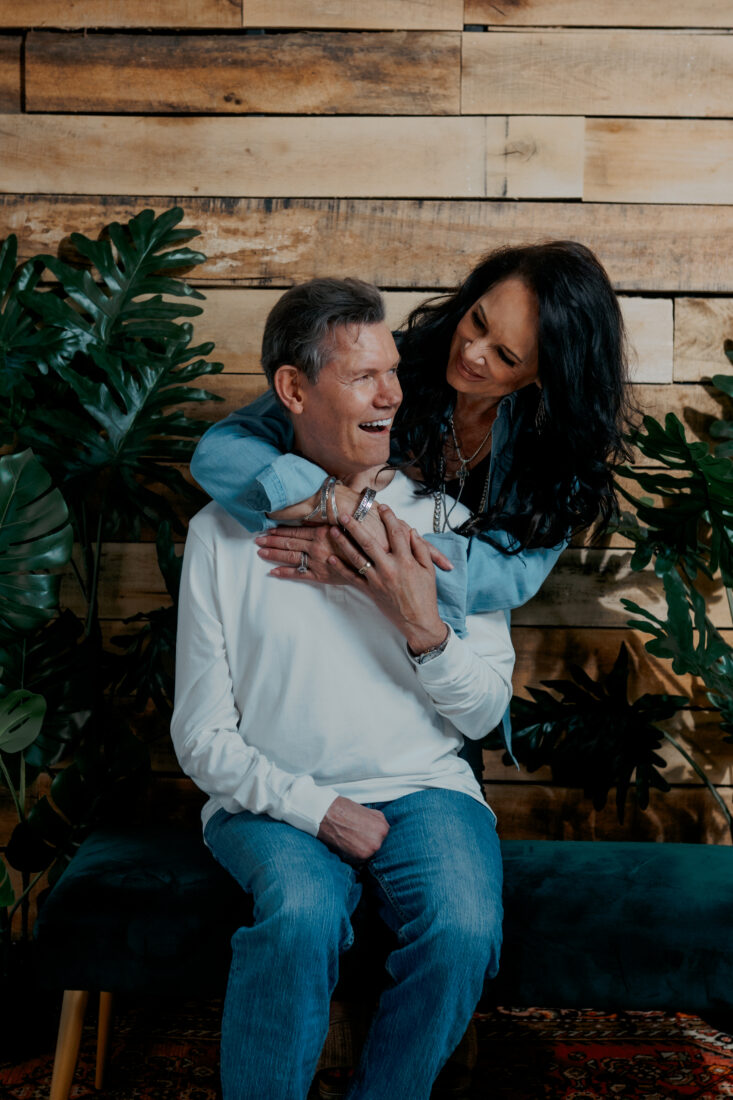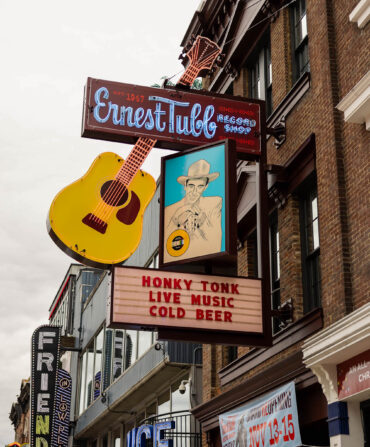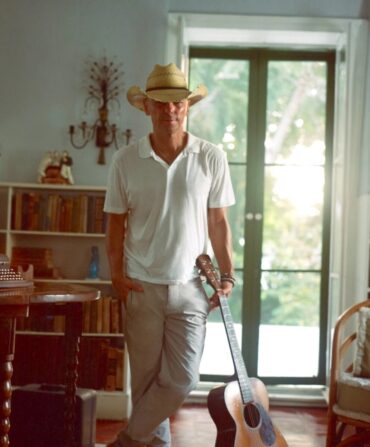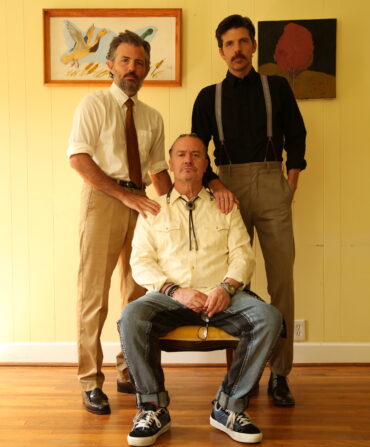When the country music icon Randy Travis suffered a near-fatal stroke in 2013, aphasia left his singing career—and his ability to communicate—in doubt. After more than a decade of silence, the seven-time Grammy winner and Marshville, North Carolina, native has once again enchanted his fans with his rich baritone in his latest single, “Horses in Heaven,” with the aid of AI and the country musician James Dupré, who lends his voice to Travis’s new songs and performs as a special guest vocalist on his tour.
No one thought Travis would be able to make new music again, let alone go back on tour. But if anyone knows how to say I told you so, he does. Clad in his favorite Converses, the Country Music Hall of Famer and his wife, Mary Travis—who since his stroke will often speak for him, basing her responses on his nods or words of affirmation—sat down with G&G to share memories of his small-town upbringing, lifelong love of horses, and his More Life Tour, which kicks into full gear this fall.

What are some of your favorite memories from growing up in Marshville?
Mary Travis: Marshville’s the backbone of Randy Travis. So much of the music that he wrote and the way that he performed his songs had to do with emotions tied to Marshville and the people there. Gaga—his daddy’s mama—lived next door. He would go over there and sit on the porch, and she’d talk to him, and she dipped a little snuff and drank a little bourbon. A lot of her wit and wisdom was planted in Randy. His mama, Bobbie, was really involved with the church there. She was just an angel on earth. When he started singing gospel music, I think it was tied to Bobbie’s influence in the church.
Do you have any favorite local places that you like to visit back home?
MT: A lot’s changed, but the Wagon Wheel Grill is still there. It was just the old kind of grandma breakfast—the homemade biscuits, waffles, pancakes, eggs, and probably the same people that have been there at the same table for the last seventy-five years. We also always drive by the old homeplace just to see it. Now they have a mural of him on the side of a building.
I’ve heard something about a drive-thru that you took your horse to?
MT: That was a place called Pruitt’s. Randy and his brothers thought that was pretty funny to go order their hamburgers on horses.
What can you tell me about your love of horses?
Randy Travis: A lot.
MT: I think he was on a horse before he could walk. His daddy always had horses and was a great horse trainer, and Randy took after him. When I met Randy, he had one horse named Preacher, a solid black quarter horse, and another one named Scout. Randy would have them lay down, roll over, play dead, smile, shake their head yes or no, kneel, sit on a bale of hay. It was just incredible.
Do you have a special horse now?
MT: We lost Scout, but Preacher’s still here. When we came home from the hospital after the stroke—we had been gone five and a half months—we went by the paddock on the way up to the house. Preacher just laid his head on his shoulders like, I’m glad you’re home, Dad. Later, Randy was sitting in his wheelchair in the kitchen, and our son, Raleigh, brought Preacher in the house, through the back door and into the kitchen. He stopped and loved on Randy a little bit, and then he took him out the living room door. That’s how gentle Preacher is.
I think horses have different ways of creating therapy for people. Just to be around them, to smell them, to feel them, that’s been great therapy.
After your stroke in 2013, I’m sure you wondered if you would ever sing again. What is it like to regain that ability?
MT: It’s been wonderful. In 2013, that was not anything we could have perceived on the horizon. AI has come up so fast and furiously. When we were approached by Cris Lacy at Warner about it, it was exciting. I wanted to hear that voice more than anything—I have for twelve years now. Randy’s always been very much a pioneer in music. When you think about the Toby Keith song, “Don’t Let the Old Man In,” that’s Randy Travis. He’s not letting the old man in. He’s gonna keep thinking of what we can do to make a difference.
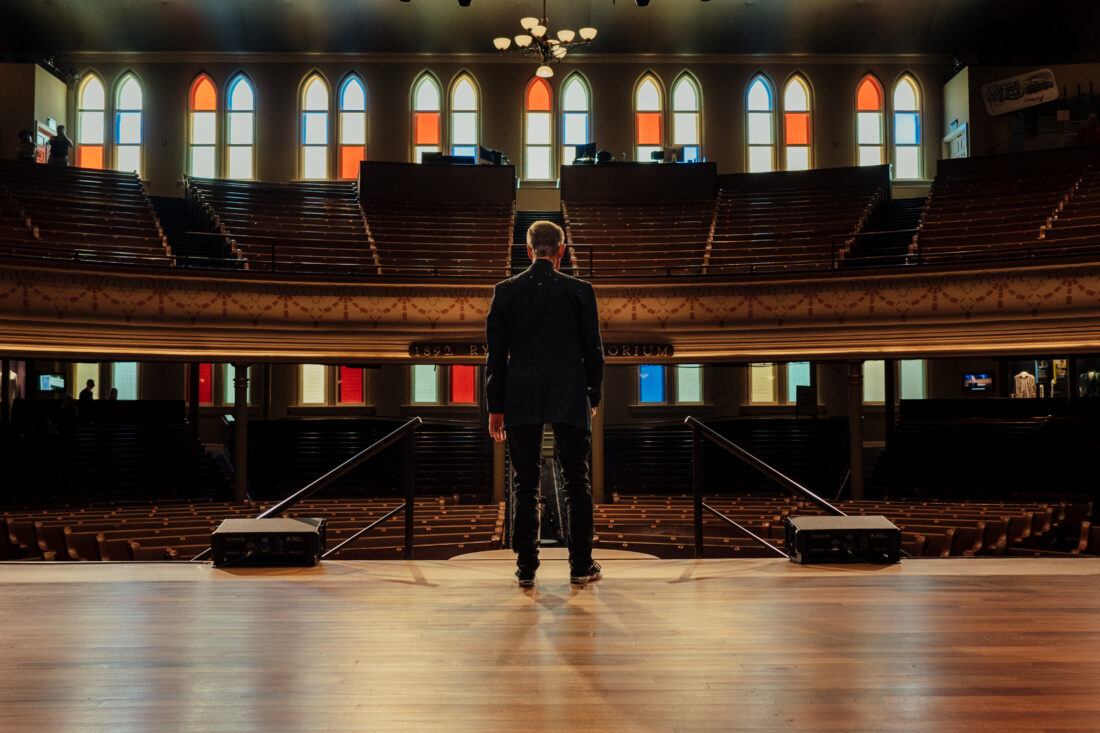
You’ve made two new songs with the help of AI: “Where That Came From” and your latest, “Horses in Heaven.” What was that process like?
MT: People think you just plug it in a computer and it spits out a song and there’s no creativity. That could not be farther from the truth. It took eleven months. In the time most people make an album, we did one song. Kyle Lehning, Randy’s longtime producer, sent the raw vocals of about forty-five of Randy’s songs to London, where they were put into the model using a vocal line provided by country music singer James Dupré. They were able to pick the voice stems of Randy’s songs and lay them over the vocal line.
When it came back from London, Kyle and Randy worked their magic in the studio to perfect the song, tweaking it to make sure that his tone, his inflections, everything was like what Randy would sing. When we finally heard the result, we knew it was worth it. Hopefully it will set a precedent for what AI is used for.
What is it like being able to go on tour again?
RT: [Smiling] Just a lot. Yeah.
MT: He loves being with his fans. He loves the energy of the stage. People always ask if it’s hard for him to hear his music played by somebody else. I think for some people it would be, but for Randy, he’s like, No, I’m good with that. Music belongs to all of us.
Do you believe there are horses in Heaven?
RT: [Smiles and nods]
MT: Yeah, I’m certain of it. I think when we get to heaven, we get to see all of our family, our friends, our pets. We get to see everybody in their glory—healthy and whole again. Including our horses.


